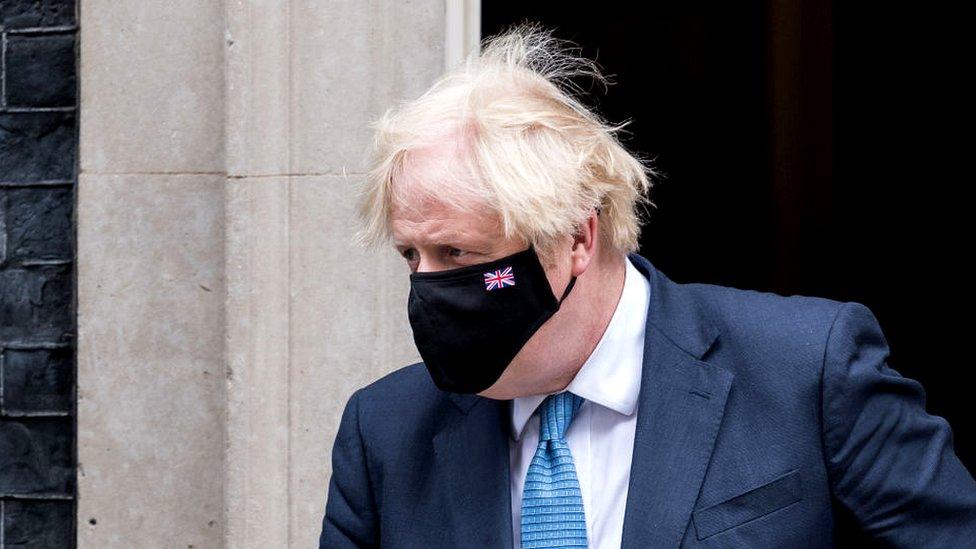Covid: What is the pilot testing scheme to avoid self-isolation?
- Published

Labour has accused Prime Minister Boris Johnson and Chancellor Rishi Sunak of trying to "dodge" self-isolation rules.
After they were named as close contacts of someone who had tested positive at the weekend, Downing Street first said they would participate in a Covid testing pilot - rather than self-isolating - before reversing this decision within hours.
Labour's accusation comes as more than half a million contacts of Covid-positive people are told to stay at home in a single week, with growing criticism about the effect on the economy and public services.
What happened at the weekend?
On Saturday, 17 July, Health Secretary Sajid Javid posted a video on Twitter, saying he had tested positive for coronavirus after feeling "groggy" on Friday night.
He had used a rapid lateral flow swab test so then took a more accurate lab-based polymerase chain reaction (PCR) test, which also came back positive.
Mr Javid confirmed this on Twitter on Saturday evening.
And at 08:00 on Sunday, Downing Street said NHS Test and Trace had contacted Mr Johnson and Mr Sunak "as contacts of someone who has tested positive for Covid" but they would be participating in a "daily contact-testing pilot to allow them to continue to work from Downing Street".
This drew criticism, including from Labour leader Keir Starmer, who said the prime minister was giving himself and the chancellor "preferential treatment".
"It can't be one rule for the Conservatives and another for everyone else," he added.
Then, speaking on the BBC's Andrew Marr Show, Housing Secretary Robert Jenrick defended the prime minister, claiming the scheme "is a well known and long standing one, it's not just available for politicians".
But within three hours of its first statement, Downing Street put out another, saying Mr Johnson would not be participating in the pilot scheme and would instead be self-isolating at Chequers, his official country residence.
And Mr Sunak confirmed he would be doing the same.
On Sunday afternoon, Mr Johnson posted a video, in which he said he had been "pinged".
"We did look briefly at the idea of us taking part in the pilot scheme which allows people to test daily," he said.
"But I think it's far more important that everybody sticks to the same rules.
"And that's why I'm going to be self-isolating until 26 July."
What is the pilot testing scheme?
There has been some confusion over which scheme was being referred to by the prime minister and others.
There is a pilot involving 40,000 people in England, recruited through NHS Test and Trace, to find out what happens if contacts of a positive case test every day and self-isolate only if one of them is positive.
Participants are randomly assigned to either:
the group who will not have to self-isolate
a control group who will have to self-isolate
But the Department of Health and Social Care (DHSC) told BBC News there was another, workplace-based scheme, which had not been publicly announced.
This pilot involves 20 organisations, including the offices of the prime minister, and is being led by NHS Test and Trace.
If someone at one of the participating workplaces is told someone they were in close contact with has Covid, instead of self-isolating they will need to take a test every day for a week (or at least five out of the seven days).
They can continue to come into work as long as they don't test positive, but will be asked to isolate on the days they are not working.
The scheme had launched in December, with Downing Street joining in May - and the results were expected later in the summer.
Cabinet Office Minister Michael Gove had taken part in June, the DHSC said, after being contacted by Test and Trace on his return from the 29 May Champions' League final in Portugal.
At the time, it was reported he was participating in the 40,000-strong daily contact testing study - and a quote from his representative appeared to confirm this.
But now, the DHSC has made clear he was taking part in the same workplace scheme in which Mr Johnson and Mr Sunak were intending to participate.
Who else is taking part?
The government says other participants include Transport for London (TfL), at just two of its sites, Network Rail, Heathrow Airport, Border Force and a series of private companies it has not disclosed.
TFL had first said it was waiting for "formal notification" from government that it would be part of a trial enabling daily tests to replace the need for self-isolation.
An official later clarified this was about a larger national trial but two of its sites were already part of a "limited" trial of daily testing.
The ISU union, which represents the UK's border guards, told BBC News that staff had avoided self-isolation by testing at sites in Dover and Manchester, as part of a pilot scheme.
Border guards pinged by the NHS Covid-19 app could drive to a test site before returning to work, as an alternative to self-isolating at home for 10 days on full pay.
But on Friday, the union said staff had been told the scheme was closing down because of low participation.
We contacted the Home Office which says the scheme is continuing.
Meanwhile, from Monday 19 July, fully vaccinated front-line staff in the NHS and in the care sector in England who are told to self-isolate will still be permitted to work "in exceptional circumstances", external with "testing mitigations", to ease pressure on the health service.
The government has said it will extend this exemption to other "critical workers" such as air traffic controllers and train signallers.

VACCINATION: How many people have been jabbed?
TESTING: How to get tested for Covid
LOOK-UP TOOL: Check cases in your area



